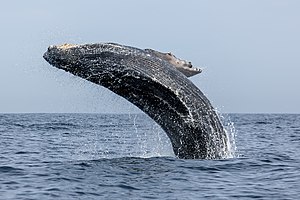Headlines:Researchers Observe Resurgence of Humpback Whales in South Georgia Coastal Waters
Jan 16, 2024

A recent study led by Jennifer A. Jackson from the British Antarctic Survey sheds light on the resurgence of humpback whales in the coastal waters of South Georgia, marking a significant recovery from historical whaling impacts.
South Georgia, located in the sub-Antarctic waters of the South Atlantic, was a focal point for whaling activities in the early 20th century. Captain C. A. Larsen identified the region's abundance of whales, leading to the establishment of the Grytviken whaling station in Cumberland Bay in 1904.
The study reveals that humpback whales, once extensively hunted in these waters, are now showing signs of recovery. A ship-based survey conducted in the austral summer of 2018/2019 estimated a substantial increase in humpback abundance, reaching 24,543 across the Scotia Arc, which includes South Georgia.
Historically, South Georgia played a crucial role as a summer feeding ground for humpback whales, with over 28,000 whales killed during local whaling operations between 1905 and 1916. The latest estimates indicate that the southwest Atlantic humpback population is now approximately 93% recovered.
The research team conducted a whale sighting survey in Cumberland Bay and nearshore waters in January and February 2019, revealing a notable presence of humpback whales. The survey observed 43 whales, with 41 identified as humpback whales. The findings suggest a potential resurgence of humpback whales in these waters, with mother-calf pairs also recorded.
Comparisons with historical data from 1905 whaling expeditions showed similarities in the number of humpback whales encountered in Cumberland Bay during January, highlighting the enduring importance of the region for these marine mammals.
The study addresses the pressing question of whether humpback whales are reclaiming their historic habitat off South Georgia following the cessation of whaling activities in 1966. The researchers also consider environmental factors, such as changes in oceanographic conditions and the distribution of humpback whales' primary food, Antarctic krill.
This resurgence in humpback whale numbers indicates positive signs of recovery and raises questions about the broader ecological impact of changing oceanographic conditions in the region. The study contributes valuable insights into the complex dynamics of marine ecosystems and the potential for resilience and recovery following conservation efforts.
